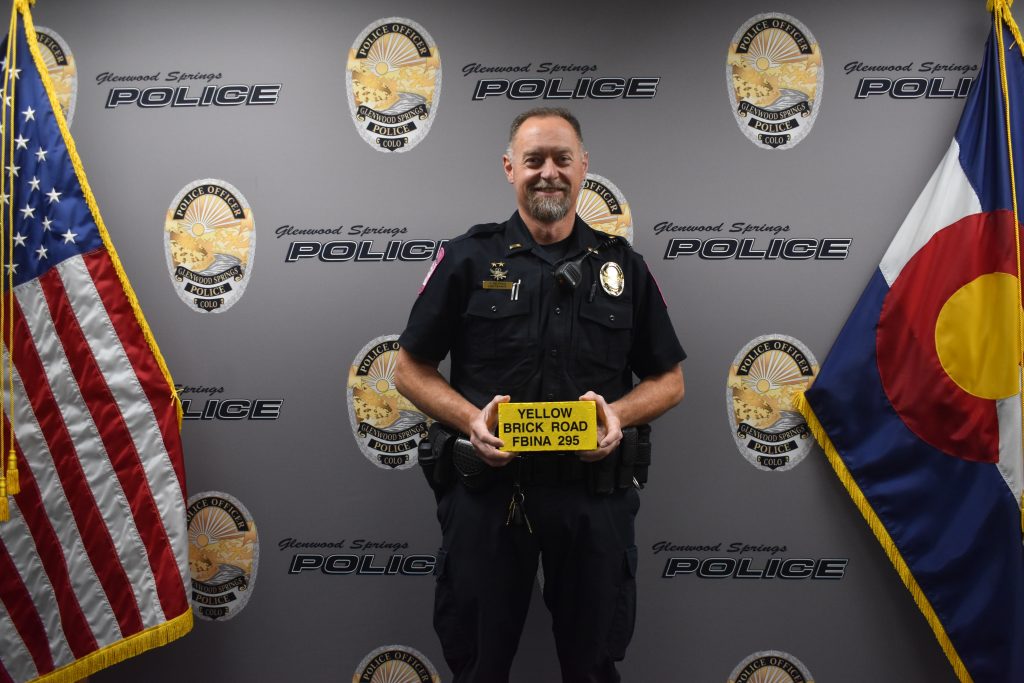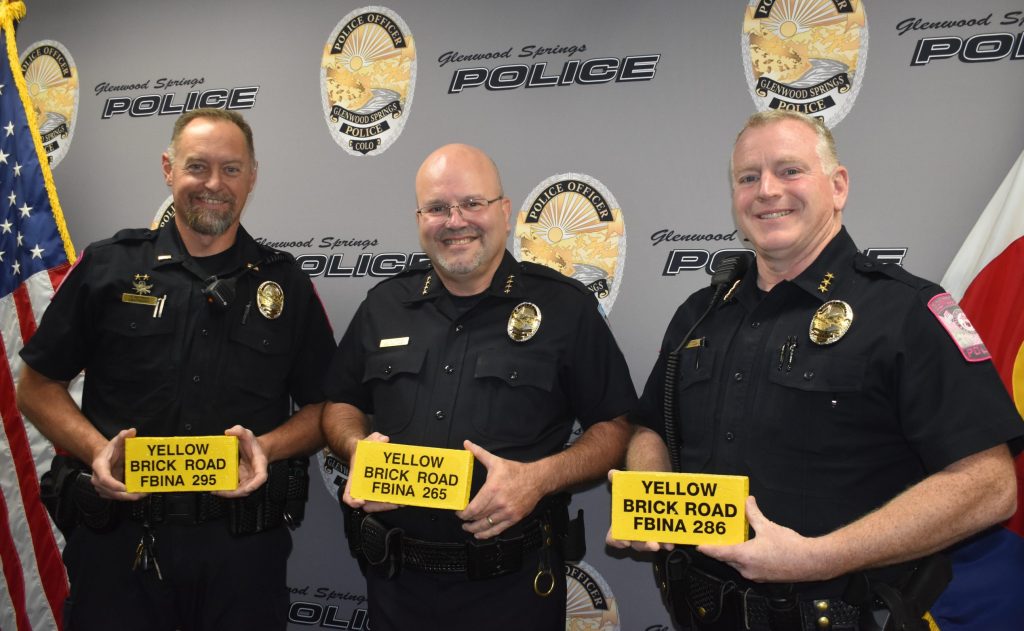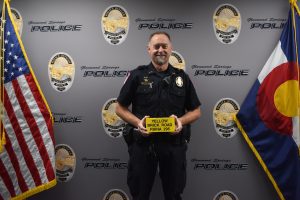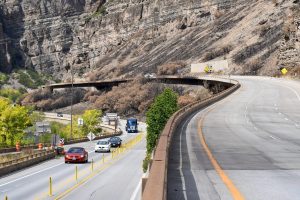Glenwood Springs police lieutenant graduates from FBI National Academy
Chris Dietrich joins an elite group of law enforcement leaders after 10 weeks in Quantico

Taylor Cramer/Post Independent
For Glenwood Springs Police Lt. Chris Dietrich, the road to Quantico began long before he wore a badge.
This summer, after 13 years with the Glenwood Springs Police Department, Dietrich graduated from the FBI National Academy — a 10-week leadership and professional development program that accepts fewer than 3% of applicants worldwide. Held at the FBI Training Academy in Quantico, Virginia, the session brought together 250 law enforcement professionals from across the United States and 22 international students.
Dietrich grew up in Aurora and graduated from Evergreen High School before making a living as a blacksmith and farrier. Later, he moved into retail management to support his young family — work that offered stability but little fulfillment. During that time, he earned a degree in criminal justice, keeping alive a quiet belief that one day he’d serve his community in a different way.
“It always felt like a calling — something I could do and do well,” Dietrich said. “It just took a little while to get into it, but from day one, I loved it. And to this day, I still love coming to work each and every day.”
When he and his wife began looking for a place to settle, Glenwood Springs stood out.
“We visited several times, and we knew that was kind of a place that drew us in,” he said. “It was the only department I applied for, and it was the only place I wanted to be.”
After more than a decade of service in Glenwood Springs, Dietrich was nominated for the FBI National Academy by Chief of Public Safety Joseph Deras — an honor that caught him off guard.
“My initial reaction was being a little overwhelmed, but also incredibly honored to even have been on the list, let alone get called to go,” Dietrich said. “It’s a very prestigious experience, and I just felt blessed to have the opportunity.”
The academy, long known for its prestige, isn’t what most people imagine.
“A lot of people assume it’s all shooting and tactical training,” Dietrich said. “But it’s focused on leadership, wellness and networking. It was like going back to college — small dorm rooms, a roommate, homework, papers and physical training — all geared toward becoming a better leader.”
Fewer than 3% of applicants are accepted into the program, which is considered one of the highest honors in American law enforcement. Dietrich said his acceptance came sooner than expected.
“Several people have waited years to get in, and I just got very fortunate,” he said. “There were some cancellations that came up, and my name got called.”
The experience tested him in unexpected ways.
“I’d never put much focus on my own mental wellness,” he said. “There was a lot of meditating, yoga and other techniques to take care of yourself. Having 10 weeks to focus on that really opens your eyes to opportunities you may not have otherwise identified.”
Dietrich even pushed himself through one of the academy’s toughest optional challenges — swimming 34 miles over the course of the program.
“I’m not a swimmer,” he said, laughing. “But I wanted to push myself, and that was a huge challenge for me that I was able to accomplish.”
The academy’s most famous physical test came at the end: a 6.1-mile obstacle course designed by the U.S. Marine Corps and known as the “Yellow Brick Road.” The winding course cuts through Quantico’s wooded hills, over rocky trails and through mud pits, tunnels and water crossings. Those who finish earn a small yellow brick engraved with “Yellow Brick Road,” a symbol of perseverance and grit among National Academy graduates.
Dietrich now keeps his yellow brick as a reminder of the effort it took to get there — and the journey that began long before Quantico.
“It’s not just about the physical challenge,” he said. “That brick represents everything the academy stands for — resilience, teamwork and pushing yourself farther than you thought you could go.”
By the end, the greatest lesson wasn’t about endurance.
“If you’re not taking care of yourself, it’s hard to lead others in a positive direction,” Dietrich said. “As a leader, my focus now is making sure I’m taking care of myself physically and mentally so I can give everything I’ve got to others without breaking myself down.”
Graduation day — Sept. 4, with FBI Director Kash Patel delivering the keynote address — brought a sense of pride and relief. Dietrich’s wife, son, daughter and daughter-in-law were there to see him cross the stage.
“It was a huge relief and a very proud moment,” he said. “It was surreal to share that stage with some of the same people who’ve gone on to be successful chiefs and executives in law enforcement.”
After a 30-hour drive back to Colorado, Dietrich’s first night home was simple — and perfect.
“The first thing I did was cook a nice home-cooked meal and get a great night’s sleep in my own bed,” he said. “Cafeteria food and dorm rooms — that’s tough for 10 weeks.”
Since the academy began in 1935, only six Glenwood Springs officers have completed the program. The first was Chief Don Williams, who graduated in 1980. Today, all three members of the city’s command staff — Deras, Deputy Chief John Hassell and Dietrich — are academy graduates, a distinction few small departments can claim.
Deras said that reflects both the city’s investment in training and the strength of its leadership team.
“We try to model our leadership for the officers and staff we have here and provide authentic leadership for our community, so they know they have a competent and well-trained workforce,” Deras said. “This is really the pinnacle of leadership training available for law enforcement executives, particularly since it’s so exclusive.”

Hassell said Dietrich’s accomplishment adds to an already impressive career.
“Lt. Dietrich has really risen up through the ranks and demonstrated proficiencies in so many areas that he’s earned this right to be in a position of leadership,” Hassell said. “Attending the National Academy is one more feather in his cap — another tool that will help him succeed in this department.”
Deras said the achievement also shows what’s possible for a department of Glenwood’s size.
“Larger departments have the ability to send more people, but since we are so much smaller, to have all three of our command-level officers go through the program is unusual,” he said. “Our community members, residents, visitors and businesses will be the benefactors, as well as our entire staff within the department.”
The National Academy doesn’t make its graduates FBI agents, Dietrich clarified, but it connects them to an international network of law enforcement professionals committed to leadership and growth.
“It’s a specific law enforcement training for executives — for leadership, wellness and networking — which is separate from FBI agents,” he said. “At the end of the day, it puts you among the elite in law enforcement and connects you with some of the best in the field. It brings you into this brotherhood and sisterhood of graduates.”
Representing Glenwood Springs on that global stage, Dietrich said, was one of the greatest honors of his career.
“We have a department I’d put up against most agencies in the country,” he said. “We face many of the same challenges, and just being able to represent a small community on that level was pretty amazing. Getting to know people from around the world and being able to brag about our community, our city staff and our department — and realizing we share many of the same successes and struggles — was really rewarding.”
Now back in Glenwood Springs, Dietrich said the lessons from Quantico stay with him every day — not as a credential, but as a commitment.
“Glenwood has always been where I wanted to be,” he said. “Now I get to bring back everything I learned and use it to serve the people who make this place feel like home.”

Support Local Journalism

Support Local Journalism
Readers around Glenwood Springs and Garfield County make the Post Independent’s work possible. Your financial contribution supports our efforts to deliver quality, locally relevant journalism.
Now more than ever, your support is critical to help us keep our community informed about the evolving coronavirus pandemic and the impact it is having locally. Every contribution, however large or small, will make a difference.
Each donation will be used exclusively for the development and creation of increased news coverage.









